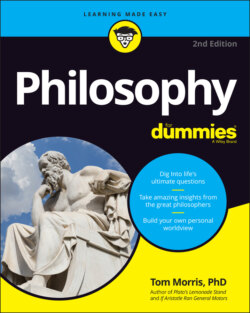Читать книгу Philosophy For Dummies - Tom Morris - Страница 22
PLATO AS THE SOURCE
ОглавлениеPlato is seen by many to be the ultimate source of all western philosophy.
Out of Plato come all things that are still written and debated among men of thought.
— Ralph Waldo Emerson
The safest characterization of the European philosophical tradition is that it consists of a series of footnotes to Plato.
— Alfred North Whitehead
Think about any illusions you could be living under right now. There may be things you value that really lack the importance you attribute to them. There could be matters you’re ignoring that are really of immense value. You might be making assumptions about your life that are based on mere appearances and not the realities of your situation. Most people are chained down by all sorts of illusions. It’s the goal of philosophy, well done, to help us all break those chains.
We actually have no choice of whether to do philosophy or not, of whether to be philosophers or not. We inevitably operate out of some philosophical worldview, however well-formed or incomplete it might be. Our choice is between bad philosophy, either unreflectively absorbed from the culture around us and the prejudices of our time, or done sloppily without guidance, and the vastly preferable alternative of good philosophy built on critical questioning and sustained thought.
Everyone has a choice. We can be poor thinkers or good philosophers. But quality comes only with care. Careful thinking makes for the best philosophy. Does your philosophy of life imprison you or liberate you? Are you a careful or careless thinker? In this book, I try to dispel some of the myths and platitudes of our own age and get out of the cave of our false assumptions. We seek philosophical enlightenment, philosophical liberation.
The first day of the rest of your life need not begin and end in Plato’s Cave.
Plato helped to launch the activity of Western philosophy, as we know it today, by writing lively dialogues featuring his teacher and mentor Socrates. Someone would have a party, and Socrates would show up. As the wine was being passed around, he’d start up a conversation, asking others present what they thought about some important topic. They’d answer, and he’d gently question what they said, investigating the ideas they brought up, and they would then reply. Then the philosopher would dig even deeper. Or Socrates would be walking down the street and see a friend, who would greet him warmly. A conversation would begin. And philosophical thoughts would soon emerge. The old man was always in action, thinking, probing, testing, and rethinking.
Philosophy is meant to be an activity in several ways. It’s a form of intellectual self-defense as well as discovery. The philosopher works to get beyond mere appearances to the important realities beneath them. The determined thinker actively works to discover new ideas, analyze, and refine those concepts, and then find new ways to put them to use, creatively and well. And this is a part of the activity of philosophy that’s often overlooked. Philosophy isn’t just about thinking hard about big ideas; it’s also about living in the constant light of those ideas that matter. It’s meant to be an adventure in living, a way of proceeding well and wisely in the world. And when you do it right, I like to think you make Plato and his mentor Socrates proud.
